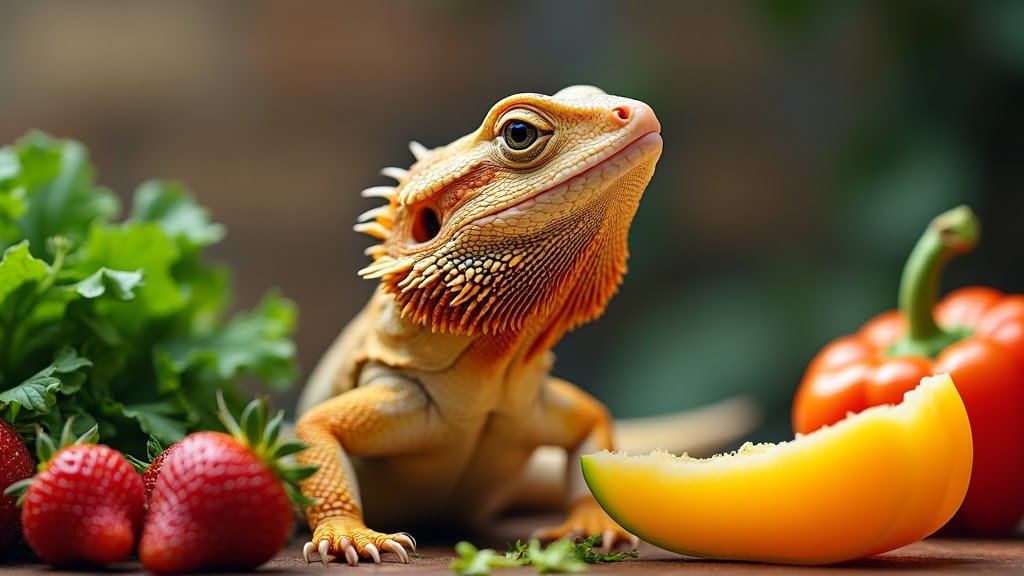Bearded dragons, or “”beardies”” as they are affectionately known, have become increasingly popular as exotic pets due to their docile nature and fascinating behaviours. But like any pet, ensuring they have a balanced and healthy diet is paramount to their overall health and happiness. One common question from beardie owners is whether melons are a safe dietary option. Let’s dive into the juicy details and find out!
Understanding Bearded Dragon Dietary Needs
In the wild, bearded dragons maintain a diet consisting primarily of insects, vegetables, and the occasional fruit. This varied diet is critical to their health, providing the necessary nutrients to keep them healthy and active.
Bearded dragons need a balanced intake of proteins, fats, vitamins, and minerals. Juvenile dragons require more protein to support their growth, while adults benefit from a higher proportion of vegetables. A varied diet ensures they receive all the essential nutrients they need to thrive.
Can Bearded Dragons Eat Melons?
Good news! Bearded dragons can safely enjoy certain types of melons. Common types that are safe for your beardie include watermelon, cantaloupe, and honeydew. These melons are not only delicious but also offer some nutritional benefits.
Nutritional Content of Melons
Melons are high in water content, making them a great option for hydration. They also contain vitamins such as vitamin A and vitamin C, which can contribute to a healthy diet. However, they are also high in sugar, which means they should be given sparingly.
Frequency and Portion Sizes
When it comes to portion sizes, less is more. A small piece of melon once a week is adequate for an adult bearded dragon. It’s best to treat melons as a treat rather than a staple in their diet. Overindulgence can lead to health issues down the road.
Benefits and Risks of Feeding Melons
Like all treats, melons come with their fair share of benefits and risks.
Benefits
- Hydration: The high water content can help keep your bearded dragon hydrated, especially during hot weather.
- Vitamins: Melons are a source of essential vitamins, contributing to overall health.
Risks
- High Sugar Content: Excess sugar can lead to obesity and other health issues in bearded dragons.
- Calcium to Phosphorus Ratio: Melons have an improper calcium to phosphorus ratio, which can hinder calcium absorption, leading to potential bone health problems.
On a personal note, I’ve found that my bearded dragon, Dug, absolutely loves a small piece of cantaloupe. However, I make sure to monitor his intake to keep his diet balanced.
Introducing Melons into Their Diet
If you’ve decided to introduce melons into your bearded dragon’s diet, it’s important to do so safely.
Step-by-Step Guide
- Start Small: Begin with a tiny piece of melon to see if your beardie takes to it.
- Preparation: Remove all seeds and rind, as these can be choking hazards and are difficult to digest.
- Serving Size: Ensure the pieces are small enough for your bearded dragon to easily eat.
- Observation: Monitor your dragon for any signs of digestive discomfort or allergic reactions.
Alternative Fruits and Vegetables
Safe Fruits
If your bearded dragon isn’t a fan of melons or you’re looking for variety, other safe fruits include:
- Strawberries
- Blueberries
- Papaya
- Mango
Recommended Vegetables
Of course, vegetables should form the bulk of an adult bearded dragon’s diet. Some excellent choices are:
- Collard greens
- Mustard greens
- Butternut squash
- Bell peppers
In my experience, my bearded dragon loves butternut squash and bell peppers. It’s always amusing to watch him munch away, clearly enjoying his meal.
Consulting with a Veterinarian
Whenever you’re making changes to your bearded dragon’s diet, it’s wise to consult with a veterinarian who specialises in exotic pets. They can provide personalised advice and ensure your pet’s dietary needs are being met.
Finding a qualified vet is crucial, as they can help with any health issues that arise and offer advice tailored to your specific pet. It’s always better to be safe and get a professional opinion.
Conclusion
In summary, melons can be a safe and tasty treat for your bearded dragon when given in moderation. The key is to observe their intake and balance it with other nutrients to maintain a healthy diet. Every bearded dragon is unique, so take note of their preferences and tolerance levels. And remember, a balanced diet is essential for their overall health and well-being.
FAQs
What types of melons are best for bearded dragons?
Watermelon, cantaloupe, and honeydew are all safe choices.
How often can I feed melons to my bearded dragon?
A small piece once a week is generally sufficient. Treat melons as an occasional treat rather than a regular part of their diet.
Can feeding too much melon cause health issues in bearded dragons?
Yes, due to the high sugar content and improper calcium to phosphorus ratio, excessive melon consumption can lead to obesity and potential bone health problems.
What should I do if my bearded dragon has a bad reaction to melon?
Stop feeding the melon immediately and consult with a vet if any adverse reactions occur.
Additional Resources
For those looking for further information on bearded dragon care and diet, there are many great books and guides available for both new and experienced owners. Ensuring you have ample knowledge will help you provide the best care for your delightful pet.
Comments Section
We’d love to hear from you! Share your experiences and tips on feeding your bearded dragon, or ask us any questions you might have about their diet. Let’s make sure our scaly friends are as healthy and happy as possible!




